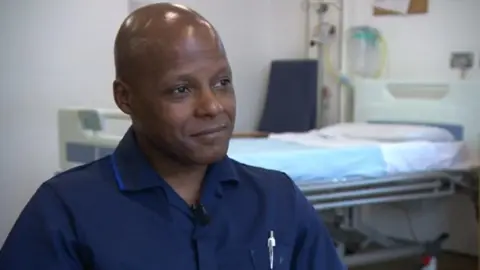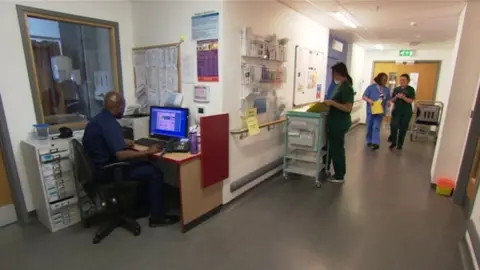'Huge talent pool' of male nurses missed in Wales
 BBC
BBCJust 12% of nurses in Wales are male, with "a huge talent pool" being missed, it has been claimed.
Of 32,927 workers registered in nursing, midwifery and health visitor roles, fewer than 4,000 are men.
Senior nurse Richard Desir is heading a campaign to attract more and said "great opportunities" exist.
The Royal College of Nursing said it believed men had been deterred because nursing is often perceived as a job for women.
Mr Desir, who works for Aneurin Bevan health board, said: "There are higher concentrations in certain sections of nursing - intensive care, mental health and emergency department.
"So what we need to do is look at areas where males can make a significant contribution."
Royal College of Nursing Wales director Helen Whyley said having more male nurses may help "break down barriers" for male patients.
She said: "Having more male nurses may change men's perceptions of their health and abilities to use services.
"Research tells us that men are often reluctant to talk about their health concerns and seek help."

Mr Desir said nurses were "at the very heart" of most healthcare teams and efforts were being made to find out why so few men were attracted.
"There are real challenges largely around the retention of our workforce and recruiting people who are not historically attracted to nursing," he said.
"Males and individuals from black, Asian and minority ethnic backgrounds are all underrepresented.
"We really are missing out on a huge talent pool."
Mr Desir trained in Manchester but moved to Wales in 2007 with his wife, describing the "great opportunities" he "probably would not have had across the border".
There are 32,927 nurses, midwives and health visitors in Wales, up from 29,400 when a recruitment drive for more staff was launched two years ago.
Of the 22,576 who are fully qualified, 2,148 are men, and of the 10,350 not yet qualified, 1,817 are men.
Health Minister Vaughan Gething said: "We want to attract people who have been working in the nursing profession for years, as well as those who may be considering nursing for the first time.
"And even those who may have already left the profession but would consider returning to practice here."
Ms Whyley added: "Nursing has historically been perceived as a career for women and in many communities this is still the case.
"This can deter men from choosing nursing as a profession."
She said it was important to encourage and recruit more men to reflect "the diversity of our society".
